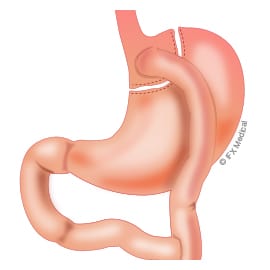
Roux-en-Y gastric bypass surgery is the most frequently performed bariatric procedure, involving both restrictive and malabsorptive surgical techniques.
During gastric bypass, the stomach is divided to create a smaller stomach pouch to which a section of the small intestine is directly attached. The remaining stomach area is not removed, but is separated from the smaller pouch.
The small intestine is divided just beyond the duodenum and a connection with the new stomach pouch is constructed. Any food consumed will bypass a portion of the small intestine where calories and nutrients are normally absorbed.
The length of either segment of the intestine can be increased to generate higher or lower levels of malabsorption.
In many cases, this procedure can be performed laparoscopically using smaller incisions instead of a large abdominal opening. Performing gastric bypass laparoscopically will reduce your risk of infection and shorten recovery time.
Advantages of Gastric Bypass Surgery
- Improve symptoms of sleep apnea.
- No postoperative adjustments are required.
- Weight loss after surgery reduces symptoms of obesity-related diseases like high blood pressure and diabetes.
- Weight loss after surgery reduces osteoarthritis pain and symptoms of gastroesophageal reflux disease (GERD).
- Produces better long-term weight loss results than traditional diet and exercise.
Potential Drawbacks of Gastric Bypass Surgery
As with any surgical procedure, abdominal surgery is associated with risks like infection, bleeding, negative reaction to anesthesia and injury to internal structures.
Roux-en-Y gastric bypass surgery alters your digestive system and reduces the amount of food absorbed through your small intestines. These changes can sometimes lead to post-operative complications:
- Patients may be at risk for nutritional malabsorption and will need to take dietary supplements daily.
- Gastric bypass surgery can be reversed, but it is not often encouraged.
- Patients may experience frequent bouts of gas and increased bowel movements.
- There is no guarantee that patients will not regain weight.
- Surgery carries a small risk of pulmonary embolism, scarring in the stomach and hernia.
- Any surgery carries a small risk of mortality. However, gastric bypass is considered very safe. The risk of death is lower than 0.1 percent, making bypass safer than routine procedures like appendectomy.
About Dumping Syndrome
Patients of gastric bypass surgery may experience a condition known as dumping syndrome after eating foods that are high in sugar or otherwise difficult for the body to handle. Sugars are normally metabolized in the first part of the small intestine, but gastric bypass surgery circumvents this part of the gastrointestinal tract, meaning that food enters the intestine at a point that is unequipped to properly process sugar.
Dumping syndrome can cause nausea, vomiting, diarrhea, sweating, cramping and increased heart rate. Though these symptoms may cause discomfort, dumping syndrome can be a powerful motivator that helps gastric bypass patients avoid unhealthy foods in order to avoid experiencing symptoms. For more information about dealing with and preventing dumping syndrome, speak with Dr. Taylor.
The risks of complication after bariatric surgery are low, but don’t hesitate to discuss any concerns you may have with your bariatric surgeon. Though every bariatric surgery has potential drawbacks, they are far outweighed by the benefits. Before deciding on a bariatric procedure, compare the advantages and disadvantages of gastric bypass surgery with those of gastric band surgery and sleeve gastrectomy.
Suggested Reading
Anissa: 141 lbs Weight Loss
After Gastric Bypass, Stay Alcohol Free
Recipe Tips Following Gastric Bypass
Also In This Section
- Switch Things Up with Interval Training
- Adjusting your Lap Band
- Tips for Working out after Lap Band Surgery
- Recipe Tips Following Gastric Bypass
- Gastric Bypass Improves Hopes of Conception
- The Benefits of Laparoscopic Adjustable Gastric Banding (Lap Band Surgery)
- Exercises for After Your Lap Band Surgery
- Top 5 Questions to Ask your Surgeon about Gastric Bypass Surgery
- Top 5 Gastric Sleeve FAQ
- Minimum Criteria for Lap-band Adjusted

